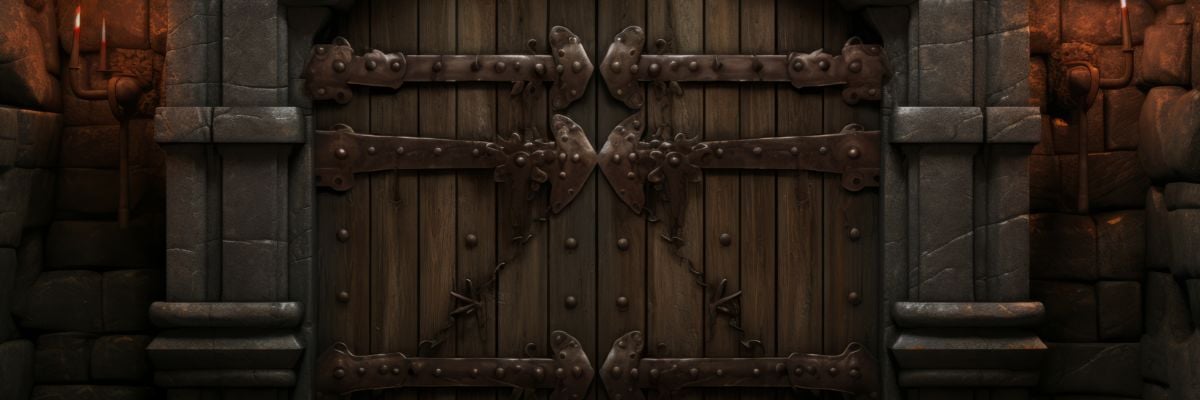
Today’s parable of the ten virgins gives us quite a lot to think about. We might ponder the reminder once again of the kingdom’s similarity to a wedding. We could also look to the symbolic meaning of things like oil, or the oil sellers, or the ten virgins themselves—all of which provoke rich meditation from the Fathers on charity, almsgiving, and even joy. But I think we had better stick with a more basic point at the heart of the parable, summed up most bluntly in that one little line: “And the door was shut” (v. 10).
Some recent translations say, rather, that the door was “locked.” That may be within the range of meaning for the Greek, but context and tradition rule it out. It is one thing for the door to be closed—suggesting a certain factual state of things—and another for it to be “locked,” implying that it might be unlocked, and that the locking and unlocking are not a fact of existence, but a matter of arbitrary will. For what is the closed door? It is death.
The Catholic tradition leaves quite a lot of room for activity after death in terms of growth and purification and perfection. But at the same time, it suggests that there is a real and absolute dividing line. Where that line is, in any given concrete situation, is often difficult to discern. I think it is completely reasonable to hope and pray that many a soul is maybe not quite so lost as it would seem, because we do not know what passes in the mind and heart in those final slow moments of life. In this month of Holy Church’s attention to the Last Things, we could do worse than read St. John Henry Newman’s wonderful poetic drama, The Dream of Gerontius. There, as the subject lies on his deathbed, as he hears the priest and the faithful praying for him, he prays that great confession of faith—“Firmly I believe, and truly . . .”—yet that quickly turns to struggle. We read:
I can no more; for now it comes again,
That sense of ruin, which is worse than pain,
That masterful negation and collapse
Of all that makes me man; as though I bent
Over the dizzy brink
Of some sheer infinite descent;Or worse, as though
Down, down for ever I was falling through
The solid framework of created things,
And needs must sink and sink
Into the vast abyss. And, crueller still,
A fierce and restless fright begins to fill
The mansion of my soul.
Whatever the complexity of those final moments, there’s no getting around that there is a moment of separation, a moment of reckoning, a moment that sets the course of all that follows. That is the “door” in the parable of the ten virgins. The fathers are nearly unanimous on this point. Take, for example, this hard reminder from St. Gregory the Great: “After sin, God accepts penance, and if everyone knew when to leave this world, he could give himself time for pleasure and time for penance. But he who promised forgiveness to the penitent did not promise a morrow to the sinner. So we must always fear our last day, since we can never predict it.” It is a rather grim reminder, is it not? But a necessary one.
This month began with a look to the glory of the saints in heaven. But after that it turns rather quickly to the knowledge that we are not all yet saints, and we need quite a lot of help to get to that vision glorious. Today’s parable certainly fits into that theme.
It might seem at first glance that the ten virgins represent the whole of humanity, and that the warning is about making sure people follow Jesus. But all ten of the virgins are, well, virgins—they are pure, kept apart from the world, consecrated for a purpose. In other words, this isn’t a parable about the Church versus the world; it is clearly a parable about Christians. Some of us will persevere; some will not.
This past week, I was reading a sermon from St. Cyprian that used to be read on the octave day of All Saints. Speaking of the heavenly country, he writes, “There are a great many of those we love waiting for us there—father, and mother, and brothers, and children, there in great company they await us, they who are sure now never to die any more, but not yet sure of us.” They who are sure now never to die any more, but not yet sure of us.
The parable of wise and foolish virgins is even invoked in the Church’s baptismal liturgy when the newly baptized is given a candle lit from the Paschal candle. I always find this one of the more striking parts of the rite: “Receive the Light of Christ, that when the bridegroom cometh thou mayest go forth with all the saints to meet him; and see that thou keep the grace of thy baptism.”
That’s the goal, really. That’s what it means to keep the oil stocked and the wicks trimmed.
Again, we can talk about the importance of various virtues. Here the Fathers particularly like to talk about almsgiving and service to the poor. But if we spell this out too much, we risk making salvation into a formula, whereas it is in the end a whole life lived in the grace of God. Keep the grace, let it grow, and let it flourish in you.
You see, the Lord doesn’t want to shut us out. He really doesn’t. He’s not standing there locking the door out of spite. On All Souls’ Day, and at any traditional requiem, we hear the Dies Irae, one of the few sequences retained in the Roman Rite after the sixteenth century. It is a song of hope as much as, or maybe more than it is a song of mourning and fear: “Think, kind Jesu! — my salvation / Caused Thy wondrous Incarnation; / Leave me not to reprobation.” The Latin more literally says, Recordare, Iesu pie, quod sum causa tuae viae: “Remember, kind Jesus, that I am the cause of your journey” (that is, from the Father to human nature—the Incarnation). What an amazing thing to say. This is not a God who wants to leave us out in the cold. His mercy is without end. The trouble is that we are not without end.
It’s never too early to start thinking about what really matters—to think about the big things: good, evil, heaven, hell, the meaning of life. If you wait until you have to think about those things, in a moment of crisis, it may be too late. Fill the lamps now. Get the house of your soul in order—with the sacrament of penance, with Holy Communion, with works of charity of mercy. And let that holy fear be transformed into the sure and certain hope of our calling and invitation to the wedding feast.



